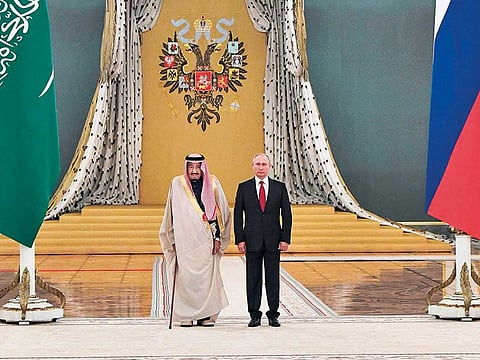Saudi Arabia, Russia open new page in relations
King Salman’s visit to Moscow reflect a “strategic shift” in the foreign policy of the two countries

Dubai: After decades of being on opposing sides of many regional issues, Riyadh and Moscow are opening a new chapter in their bilateral relations today by holding their first-ever summit in the Kremlin.
Driven by regional developments and changing alliances and circumstances, both Saudi Arabia and Russia believe cooperation is the best way forward, political analysts said.
“The visit marks a strategic turning point in the foreign policy of both Saudi Arabia and Russia,” Jeddah-based Saudi political scientist Waheed Hamza Hashem told Gulf News.
The two leaders decided it would be more useful to find a way out of the impasse through cooperation, Hashem explained.
“The fact that King Salman himself has gone to Moscow is very significant,” said Jane Kinninmont, Senior Research Fellow and Deputy Head, MENA Program at Chatham House, an independent policy institute based in London—he is the first Saudi monarch to do so.
“This high level visit sends a strong message”.
Prior to the visit, the two countries had already exchanged views via diplomats, business people and academics in search of common ground on mutual issues, including the war in Syria and oil and economic interests.
In 2007, President Vladimir Putin became the first Russian President to visit Saudi Arabia.
Both Saudi Arabia and Russia were on opposing sides of the war in Syria (Riyadh against Al Assad while Moscow backed him) and disagree on many regional issues.
Russia also is against Saudi Arabia’s military action in Yemen and is a considered to have good relations with Iran—a regional foe to Riyadh.
But if given a choice, Saudi Arabia prefers to negotiate with Russia rather than Iran (both backers of Al Assad) in Syria, she explained.
“The fact they are on different sides of two conflicts gives them all the more reason to talk,” said Kinninmont, adding that the impasse in Syria, was not benefiting either party.
Therefore, moving ahead with ending the war in Syria is expected to be among the prominent fruits of the four days visit of King Salman.
The two countries want to “maximise benefits and minimise costs,” Hashem said.
“What remains is the fate of the Syrian President Bashar Al Assad, which continued to be an obstacle in establishing a better relation,” he said. However, they might agree on forming a transitional government and elections in Syria, where there is no place for Al Assad, he expected.
Geopolitics aside, the two countries are major oil producers in the world and the stability of oil markets and oil prices is in both of their interests.
Moscow started in 2013 to regain its former powerful position and started to increase its involvements in international politics after nearly 23 years of withdrawal in the aftermath of the collapse of the Soviet Union in 1990. Russia also wants to attract foreign investments and to overcome the western sanctions imposed on
Up to 100 Saudi businessmen are accompanying the King to Moscow and a major oil investment fund is due to be agreed on.
“Economic, energy and military agreements have already been announced. We may see some sort of communique on Syria, where the two countries are already trying to accommodate each other. Some of the Saudi-backed opposition groups in Syria have already signed up to the de-escalation zones favoured by Russia, which the Saudi government has expressed its support for,” said Kinninmont.
“This is a new step in a long term process of developing relations…(King) Salman’s visit is not a sudden shift; it reflects growing economic cooperation,” said Kinninmont.



